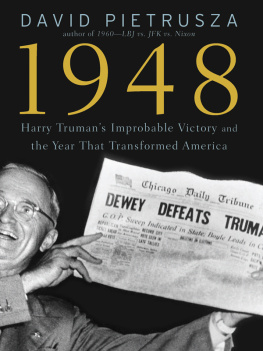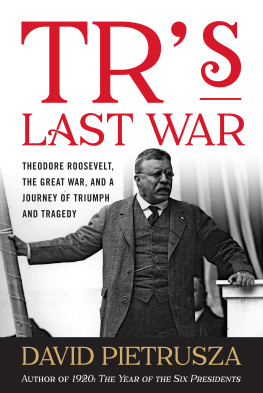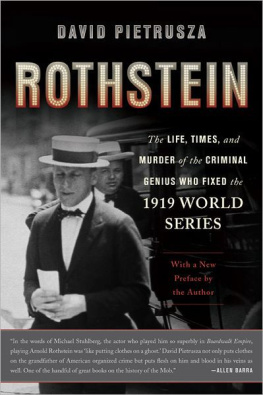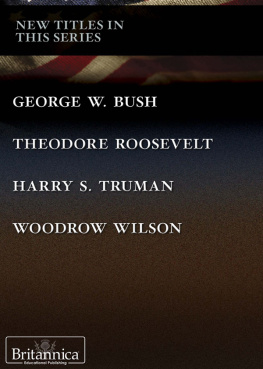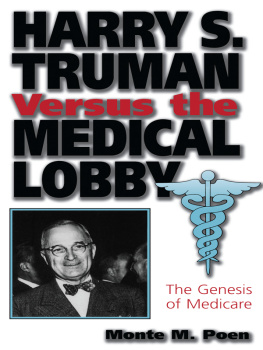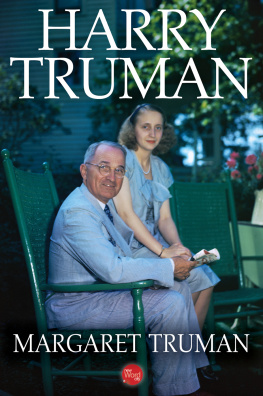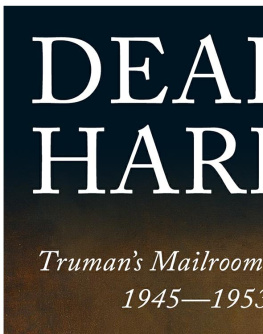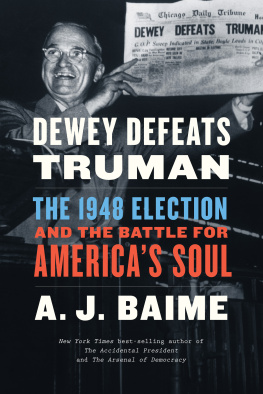

STERLING and the distinctive Sterling logo are registered trademarks of Sterling Publishing Co., Inc.
2011 by David Pietrusza
All rights reserved. No part of this publication may be reproduced, stored in a retrieval system, or transmitted, in any form or by any means, electronic, mechanical, photocopying, recording, or otherwise, without prior written permission from the publisher.
ISBN 978-1-4027-6748-7 (hardcover)
ISBN 978-1-4027-9082-9 (ebook)
For information about custom editions, special sales, and premium and corporate purchases, please contact Sterling Special Sales at 800-805-5489 or specialsales@sterlingpublishing.com.
2 4 6 8 10 9 7 5 3 1
www.sterlingpublishing.com
A. M. D. G.
Col. Jacob M. Arvey: Fifty-two-year-old Chicago Democratic leader. A rare non-Irish (Jewish, in fact) big-city boss. Passionately liberal. The five-foot-four-and-a-half-inch Arvey, desperate for victory in 1948, contends that Gen. Dwight D. Eisenhower is the kind of liberal with whom we could win, both nationally and locally.
Lauren Bacall: Brooklyn-bred twenty-something Hollywood star. The legs on Harry Trumans piano.
C. B. Beanie Baldwin: Forty-six-year-old, Virginia-born former executive vice president of Sidney Hillmans Political Action Committee of the Congress of Industrial Organizations (CIO-PAC). Henry Wallaces Progressive Party campaign manager in 1948. A covert Communist.
Tallulah Bankhead: Forty-six-year-old Hollywood and Broadway star. Daughter of the late Speaker of the House, William Bankhead. Tom Dewey, the Alabama-born Tallulah informs a nationwide radio audience, is not a real man.
Alben W. Barkley: Seventy-year-old Democratic U.S. senator from Kentucky. Senate minority leader. Barkleys electrifying 1948 convention keynote speech eventually propels him to the vice-presidential nomination. It will have to come quick, the Kentuckian finally complains, but adds, I dont want it passed around so long it is like a cold biscuit.
Elliott V. Bell: Forty-six-year-old New York State superintendent of banks. Tom Deweys hunchbacked Columbia University classmate, speechwriter, and alter ego. If anyone can be tagged as the architect of the disaster, says one historian of the campaign, it is Bell.
Elmer A. Benson: Fifty-three-year-old Progressive Party chairman. Defeated by Harold Stassen for reelection as Minnesota governor in 1938.
Andrew J. Biemiller: Forty-two-year-old former Socialist Party member and Milwaukee Democratic congressman. Cosponsor, with Hubert Humphrey, of the liberal civil rights plank adopted at the 1948 Democratic National Convention (DNC). In Harry Trumans opinion, Crackpot Biemiller.
Leslie L. Biffle: Sixty-eight-year-old secretary to Senate Minority Leader Alben Barkley. Truman suspects my good friend Biffle of angling to replace him with Barkley, but by campaigns end, the diminutive Biffle will embark on an undercover personal mission to gauge the embattled Trumans support. One of a handful of political operatives who are convinced Truman will win. They dont make them any better than Biffle, says Truman publicly, and you can quote me on that.
Chester Bliss Bowles: Forty-seven-year-old, blue-blooded former New Deal price-controls czar. Democratic candidate for Connecticut governor in 1948. Quintessentially liberal. Aboard, albeit with deep reservations, the July 1948 draft-Ike movement.
David Brinkley: Twenty-eight-year-old, North Carolinaborn NBC News White House correspondent.
Herbert Brownell Jr.: Forty-four-year-old Manhattan attorney. Former chairman of the Republican National Committee. Tom Deweys uneasy campaign manager in 1944 and 1948.
McGeorge Bundy: Twenty-nine-year-old Boston Brahmin. Dewey speechwriter and member of his elite shadow State Department. There was only one rule, recalled Bundy: Never write anything the governor hasnt said before.
Warren Earl Burger: Forty-one-year-old St. Paul, Minnesota, attorney. A key player in Harold Stassens energetic but ill-fated effort.
Whittaker Chambers: Forty-seven-year-old Time magazine editor. Onetime Soviet espionage operative. His bombshell charges against former New Dealer Alger Hiss (the closest friend I ever had in the Communist Party) will fuel the Reds-in-government issue erupting just before Election Day 1948. I know that I am leaving the winning side for the losing side, Chambers tells the House Un-American Activities Committee (HUAC), but it is better to die on the losing side than to live under communism.
Clark M. Clifford: Forty-one-year-old special counsel to the president. Trumans most influential adviser. The handsome, wavy-haired Clifford shamelessly assumes credit for James Rowes startlingly prescient blueprint for the 1948 Democratic victory. The greatest ambition Harry Truman had, Clifford will recall, was to get elected in his own right.
T. Eugene Bull Connor: Birmingham, Alabamas fifty-one-year-old segregationist public safety commissioner. In May 1948, Connor arrests Progressive Party vice-presidential nominee Glen H. Taylor. Says Connor, Theres not enough room in town for Bull and the Commies. Will he arrest Henry Wallace as well?
Jonathan W. Daniels: Forty-six-year-old Truman campaign aide, on leave from his post as editor of the Raleigh News & Observer. Former press secretary to both Truman and FDR.
Jo Davidson: Sixty-five-year-old dean of American portrait sculptors. Honorary president of the Progressive Citizens of America (PCA). Cochairman of the Wallace-for-President Committee.
Thomas Edmund Dewey: New Yorks forty-six-year-old Republican Governor. Renowned former racket-busting Manhattan district attorney. GOP presidential nominee in 1944 and 1948. Derided by Alice Roosevelt Longworth as the little man on the wedding cake. You know that your future is still ahead of you, Dewey blandly tells voters. Deweys already lies behind him.
William O. Douglas: Fifty-year-old U.S. Supreme Court justice. Former chairman of Franklin D. Roosevelts Securities and Exchange Commission. Harry Truman wants him on his ticket; Douglas refuses, unwilling to be, as he jibes to a friend, number two man to a number two man.
W.E.B. Du Bois: Eighty-year-old icon of the civil rights movement. For Wallace in 1948. No president has spoken fairer on race discrimination than President Truman, contends the skeptical Du Bois, and few presidents have done less.
Allen W. Dulles: Fifty-five-year-old Wall Street attorney and a key man in the wartime intelligence agency, the Office of Strategic Services (OSS). In 1948, Deweys gout-ridden key adviser on foreign policy and intelligence issues.
John Foster Dulles: Allen Dulless sixty-year-old brother. Deweys foremost foreign policy counselor and his choice for secretary of state. Dulless passion for a bipartisan foreign policy helps hamstring Deweys campaign. Alger Hisss mentor at the Carnegie Endowment for International Peace.
Dwight David Ike Eisenhower: Fifty-eight-year-old former supreme commander of Allied forces in Europe. Wildly popular in both parties. The choice of many Democrats to replace the unpopular Trumanbut Ike responds, I am not available for and could not accept nomination to high political office. In 1948, Eisenhower will, nonetheless, be inaugurated presidentof Columbia University.
George M. Elsey: Trumans thirty-year-old, Harvard-trained speechwriter. Author of Trumans pivotal 1948 State of the Union address.
Next page
